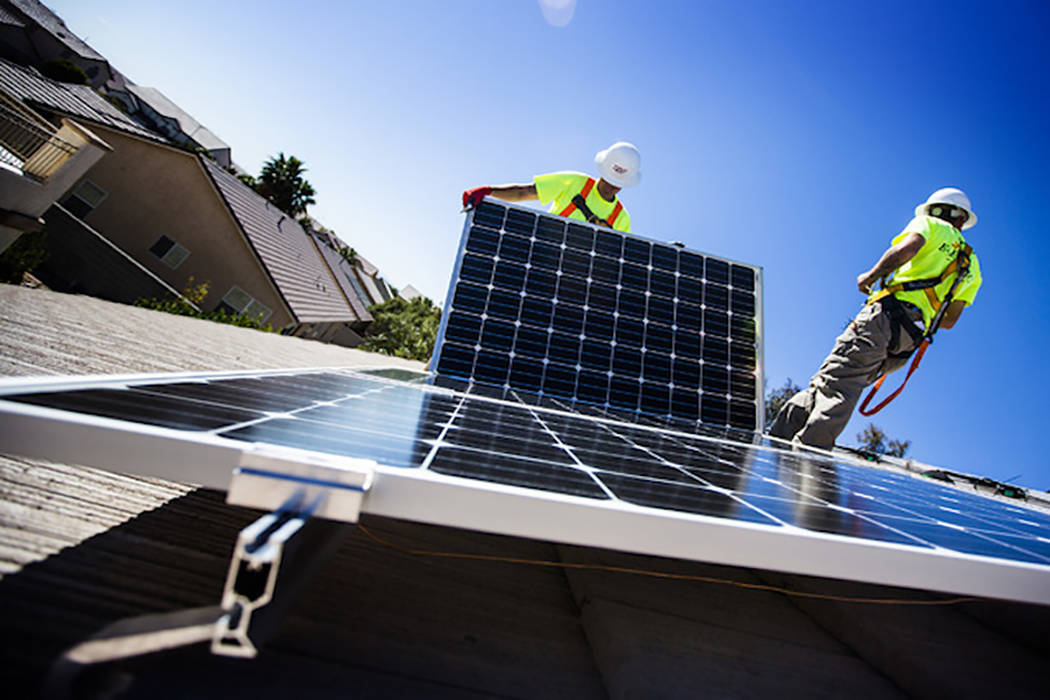Rooftop solar could put money in pockets of Nevada customers

CARSON CITY — A bill that would restore commercially viable rates for homeowners who want to install rooftop solar panels and participate in net metering had its first hearing Monday in an Assembly subcommittee.
Assembly Bill 270, introduced by Assemblyman Justin Watkins, D-Las Vegas, would set a minimum credit of 11 cents per kilowatt hour for electricity that is fed back into a utility’s grid from a rooftop solar installation.
Of this amount, 9 cents would encompass such benefits as avoided new generation capacity and avoided transmission and distribution costs. The other 2 cents would be based on such environmental benefits as avoided carbon dioxide emissions and avoided water consumption, as well as the benefits of job creation by renewing the rooftop solar industry in Nevada.
Rooftop solar customers would still be responsible for fixed charges that are paid by all utility customers.
The bill was reviewed by the Assembly Commerce and Labor Subcommittee on Energy, where it was endorsed by a number of pro-solar groups and businesses.
But Assemblywoman Maggie Carlton, D-Las Vegas, questioned how the bill would help her constituents, the senior citizens living in mobile home parks who cannot afford to install rooftop solar.
Assembly Speaker Jason Frierson, D-Las Vegas, said before the hearing that Watkins’ bill would encourage people to embrace the technology.
“Not just as a cost-saving measure, but as a smart measure and as a way to help foster future jobs and as a way to be better with the environment,” Frierson said.
BRINGING BACK SOLAR
Watkins said his proposal is a starting point for discussions on how to restore the rooftop solar industry in Nevada. Major solar companies left the state after the Public Utilities Commission adopted a rate structure for net metering customers that increased a flat monthly charge and reduced the amount of credit for the excess electricity generated by rooftop systems.
“I think it is the beginning point of the conversation,” Watkins said. “Everybody — the utility, the PUC and the industry — all want the problem solved. So I have no doubt those terms can be agreed upon.”
Watkins said his bill would have no limit on the number of customers or the amount of energy that could be generated through rooftop solar installations.
NV Energy is part of the discussions.
Judy Stokey, vice president of government and community relations for the utility, said it is ready to move forward quickly upon passage of a bill. The right number for the net metering rate is under discussion, she said.
The basis for the creation of the current, less favorable net metering rates was an analysis by PUC staff that showed a subsidy to solar customers from non-solar ratepayers. That analysis has been challenged by solar proponents, who argue it did not take into account the many benefits the systems provide to the grid.
Since then, the PUC has decided to grandfather in thousands of rooftop solar customers that had systems installed or who were in the pipeline for approval under the old rates for 20 years.
But new requests for installations have dried up.
The Solar Foundation reported this year that Nevada saw a 32 percent job loss in the rooftop solar industry in 2016, from 8,285 jobs to 5,598.
Contact Sean Whaley at swhaley@reviewjournal.com or 775-461-3820. Follow @seanw801 on Twitter.












